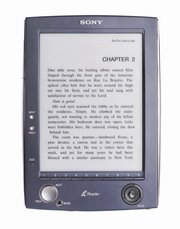Technology
The E-Ink/Philips technology is now spreading worldwide. iRex Technologies is a spin-off company from Philips, which has developed an A5-tablet and is experimenting with digital newspapers and e-Books worldwide. Jinke, a Chinese company, plans to sell into the education field in China and other markets. Plastic Logic Inc., a British startup, is working on a flexible display the size of an 8 1/2-in.-by-11-in. piece of paper that can receive books, news, or e-mail wirelessly; the company is partnering with Japan's telecom company NTT DoCoMo and plans to have a product (a pull-out extension to a mobile?) on the market by early 2008. These companies are new and innovative companies, backed by moguls like Philips and NTT DoCoMo, but do they have the experience to put e-Books in the business and consumer markets?
Industry champion needed
This type of device needs a champion company, which has oversight over the whole value chain and knows how to put a business plan together. In principle, all the pieces of the puzzle are on the table now. There is attractive hardware, there are loads of content and the equipment is more user friendly than its predecessors. The only problem is still the business model. The present situation in e-Books compares with the introduction of the iPOD. Apple developed a strategy for this gadget: attractive hardware; access to a vault of music and a user friendly machine. Of course, heart of the iPOD venture was the i-Tune business model: attractive prices, vast offer of content and less user restrictions. Comparing e-Books to iPOD, the e-Book sector has a problem: it does not have a champion like Apple. No traditional publishing company has put its money in the e-Book future like the music companies had not put money in the music download services. No computer and consumer electronics companies have so far been seen as the e-Book champion. Could Philips be the champion or Sony?
Philips is a consumer electronics manufacturer. It has dabbled in intellectual property assets like music with vinyl records and CD. The compact disc seduced the company, led by Jan Timmer, into the CD-Interactive venture in which they lost millions of euros. After the change of the guards in 1996, the new boss Cor Boonstra killed Philips Media and buried CD-Interactive as a consumer product. The clear line now is to have products and services and not intellectual content products. So Philips will not be a candidate, unless for medical, busines and technical manuals.


First generation of e-Books and a digital paper reader
What about Sony? This company hijacked in 1990 the term e-Book, created an E-Book reader of 450gr and with a blackwhite screenand used the mini disk as e-Book carrier. But it was a disaster in the USA and Europe. By 1995 and 635 public titles it was all over. But after a decade Sony is back for more. Sony is now the first major player to take advantage of the E-Ink/Philips technology for e-Books. It had a trial in Japan with a Librié with a digital paper screen and will now start with a newly designed reader in the USA. Sony’s e-book could go as long as 20 books between battery charges. The text also looks just as sharp as ink on a printed page, since each capsule is the size and pigment of a grain of laser-jet toner. And the price has been set for $350. Sony will offer a vault of some 10,000 book titles for download from its online store. But does Sony have the magic that Apple had creating the iPOD?
So, Sony has more experience with e-Books than anyone else. The first version of E-Book with a reader and mini-disc was a false start. For the present start the new reader looks attractive, is seen as user friendly equipment with an offer of 10.000 book content. All basic conditions look fulfilled by Sony. But there is a downside. There is the price for an e-Book. The price is not an easy one; of course like a DVD player it will go down when more people buy it. But the price is close to the price of an Xbox and is highter than Sony’s Play Station. How does the tablet compare to them? It is no more that the electronic cover for an e-Book with very few facilities. But there is another more serious problem: problems with (over)protecting intellectual content property: DRM technology problems on CD-ROMs and DVDs, while in the Japanese e-book trial time bombs terminated the reading of the book (if you want to finish the book you will have to buy it again). And producers are not happy with the proprietary production and DRM software (happily other e-Book manufacturers such as iRex Technologies offers an open production environment). So the conclusion will be, that Sony’s image is tainted in the e-Book environment and will not be a clear cut champion for e-Books like Apple was for iPOD.
Where is the white knight who will save the e-Book technology that has finally matured? Will it be Apple again, using the iPOD recipe, or will it be Google, using the experinece of the Google Print program?

No comments:
Post a Comment